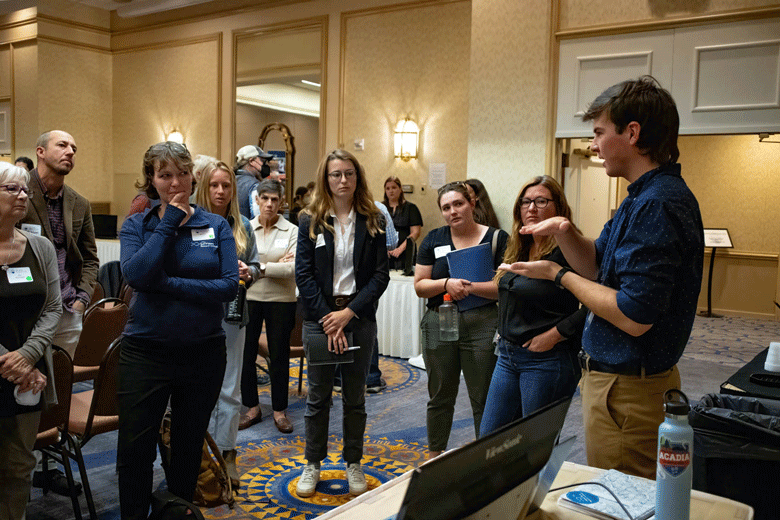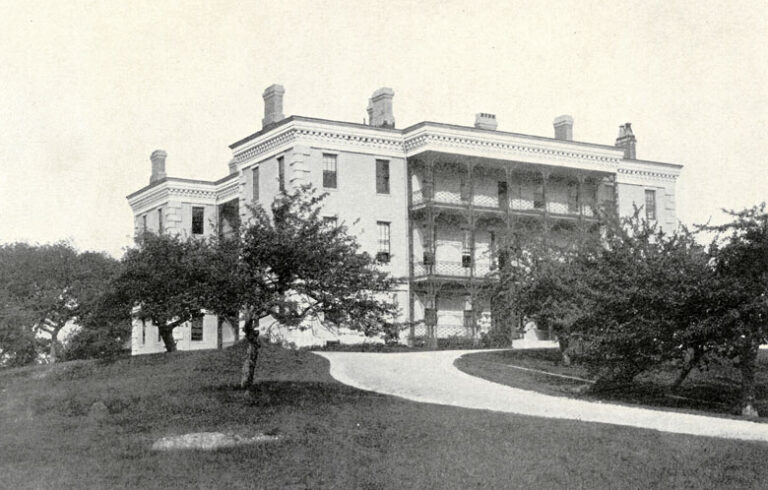What if a conference for climate practitioners and problem solvers was based on conversation? We answered this question in September with around 140 gathered in Portland to hear—and discuss—climate-related presentations from a wide variety of those working on such issues.
And we learned that it works.
Equal time and focus were given to comments—and sometimes hard questions—prompted by those presentations. The cumulative effort of the Island Institute’s 2022 Climate Symposium was to collaboratively envision a climate-forward Maine.
Two themes: community resilience planning and working waterfront solutions, permeated the conversations.
Two themes: community resilience planning and working waterfront solutions, permeated the conversations.
Island Fellow Paige Atkinson’s clear voice could be heard talking to a small group about Eastport’s microgrid and its community process. Her voice mixed with Hank Berg’s, who is general manager of Casco Bay Lines which is working to electrify the ferry fleet just blocks from where we gathered.
The urge to connect in one-on-one conversations made for a lively lunch break with participants and presenters alike launching into shared insights, knowledge, and contact information. So engrossed in conversation were participants that it was a challenge getting them back up the stairs for the second session.
That session included presentations on community planning efforts, such as a talk by Allen Kratz and Randy Curtis, facilitators of Peninsula Tomorrow, an inter-local climate resilience group working to support communities in identifying and securing funding for climate mitigation and adaptation.
In a similar vein, Ruth Indrick from Kennebec Estuary Land Trust discussed how a marsh restoration and road protection project in Georgetown has federal, state, and town governments and a regional land trust collaborating.
A screening of the Island Institute’s new Climate of Change film, “Clean Energy Solutions for the Working Waterfront,” was followed by a panel discussion with representatives of three Maine-based businesses: Luke’s Lobster, Community Shellfish, and Maine Electric Boat.
The panelists shared their motivations for taking action to reduce their business’s reliance on and use of fossil fuels and asserted that clean energy not only can help create a better future but be a solid business decision.
Wrapping up the day, the Island Institute’s Dr. Susie Arnold facilitated a conversation with Dr. Ayana Johnson. Susie and Ayana, both marine scientists, talked about changes in fisheries globally, how we must think long-term, and that tradeoffs are necessary to realize a vibrant future.
In a realistic but humor-filled way, they made it clear to the audience that our only choice moving forward is often not the easy or economical choice if we want to realize a more livable and equitable planet.
Two years ago, the Maine Climate Council’s 2020 Maine Won’t Wait publication made clear that climate action requires the support and engagement of Maine people. Though delayed by the pandemic, we finally helped move toward that goal by convening 17 presenters to share 14 inventive coastal climate solutions, with attendees ranging from coastal and island community members to state and regional climate professionals.
It was our hope that by bringing folks together to converse about solutions being tried and work underway, that they would leave more empowered and emboldened to act, engage, and lead. And to have hope.
If we did this for 20 people, ten people, or even just one person, the symposium was a success. And we think we did and for more than one person.
As one participant remarked, “The tone of the day was very positive—an approach to climate challenges with creativity and opportunity at the grassroots level.”
As climate practitioners, the symposium was an important reminder that conversations are the catalyst for our state’s coastal and island communities’ ability to remain vibrant and sustainable.
Lisa Millette and Abby Roche are community development officers with the Island Institute, publisher of The Working Waterfront. Millette works on business resilience, clean energy, and sea level rise issues. Roche works on sea level rise and community leadership. They may be reached at lmillette@islandinstitute.org and aroche@islandinstitute.org.





